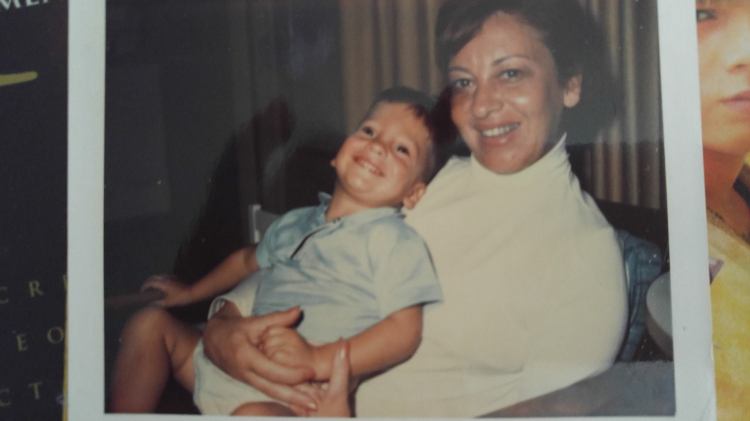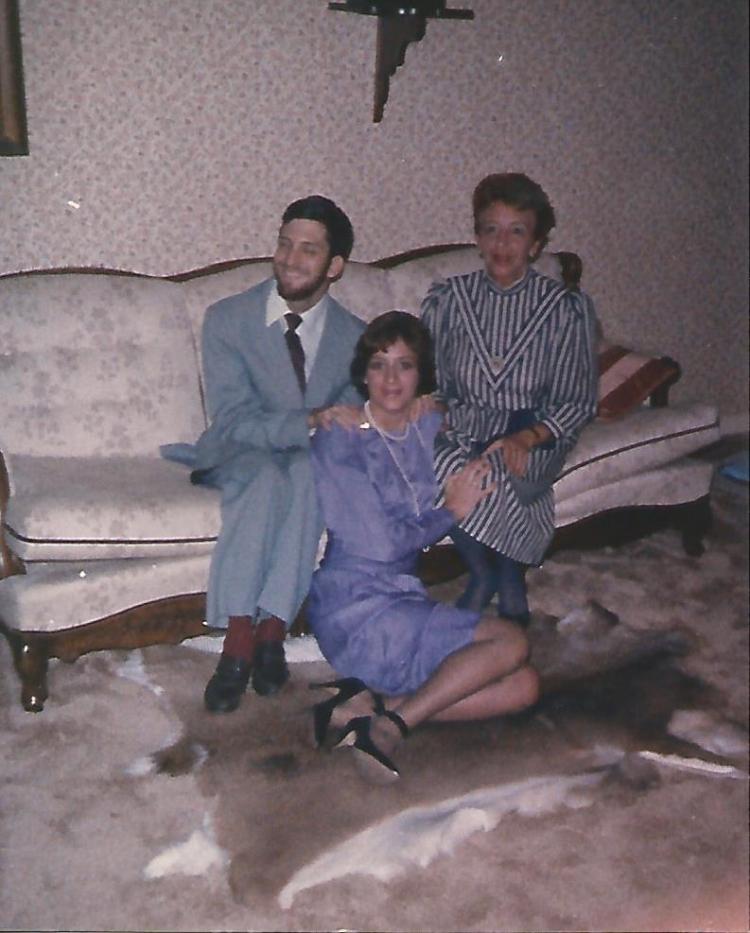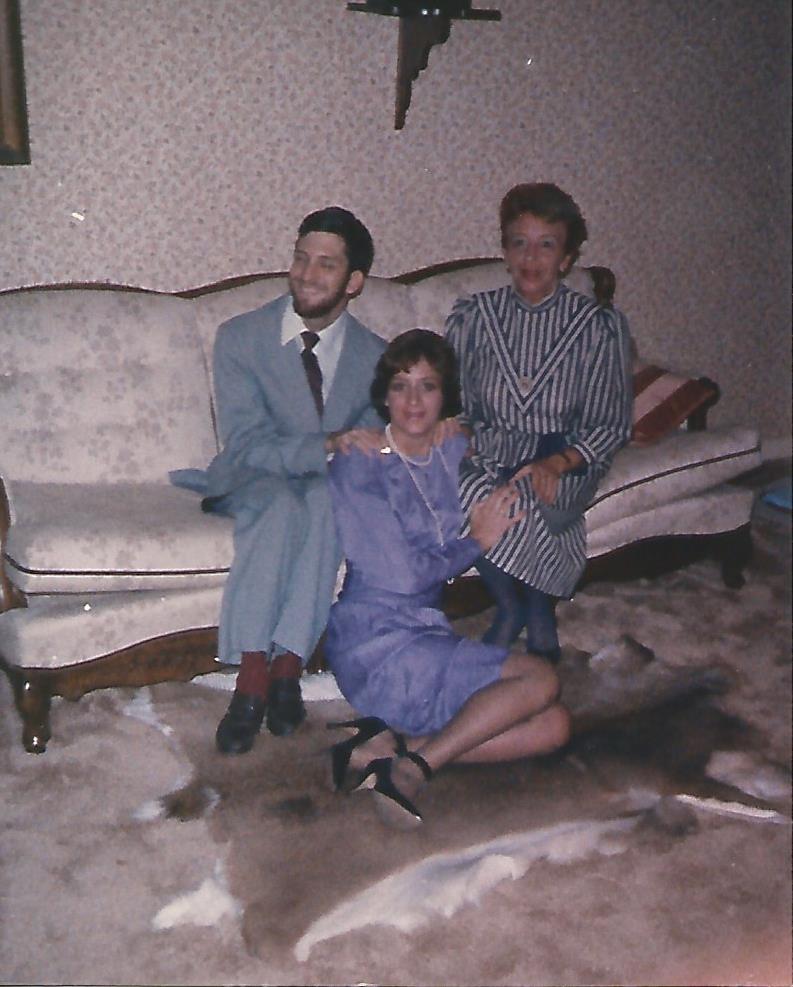
As the fifth anniversary of my mom’s death draws ever near – it falls on Sunday, July 19 – I find myself in an emotional tug-o’-war, just as I have done over the previous four anniversaries. I’m trying hard not to let myself fall into a depressed fugue, but at the same time I can’t totally suppress my emotions. The past decade has been rather tumultuous for me, starting with the sudden decline of Mom’s health in 2010, then peaking with her death in 2015, and then the legal, financial, and (especially) the emotional aftershocks, which continue to this very day.

Sometimes I look back at my family’s dysfunctional history and wish that things had gone very differently, especially the dynamic between my older half-sister Victoria and my mom, and as a corollary to that, the dynamic between the two half-siblings.
For that to happen, the central figure in the tragicomedy that was our family’s life in Miami between 1972 and 2015 would have needed to have a different personality and a different outlook on life. My mom and I tried our best to give love, emotional support, and approval to my half-sister. especially when she was in her early 20s and 30s. After all, Vicky was my mother’s first-born child and part of the family.

Unfortunately, Vicky always exhibited disruptive behaviors that suggest to me that she suffers from some mental illness. Even as a small child, my older half-sister was angry, didn’t make life-long childhood friends outside the family, and if my mother’s anecdotes about Vicky as a little girl and young adolescent are to be believed, she was an incredibly willful and angry kid who either threw tremendous temper tantrums or lied constantly…almost pathologically so.
Back when our mother was still alive, I used to discuss the latest “Vicky episodes” with one of my long-time Internet friends, a writer who is well-versed in psychology and mental illnesses. She would ask me questions like, “When Vicky starts an argument and escalates it, how does she describe it afterward? Does she apologize and takes responsibility for her actions? Or does she spin the story to blame the other person or persons involved? Does she lie excessively? How does she respond when caught in a lie?” And so on and so forth.
I answered the questions as accurately and honestly as I could, of course; I am a decent observer of human behavior – a necessary skill if one wants to be a good writer, especially of fiction – but my training was in journalism and creative writing, not psychiatry or mental health.

But since I was then trying to wrestle with the challenges of caring for my ailing mom, running a household, and coping with Vicky’s difficult behavior, I was seeking answers and not just bad-mouthing a family member in a stressful time.
I told my friend that when Vicky got into any sort of dispute – be it with my mother, one of her friends, neighbors, or acquaintances, or (especially) me, she always “spun” the narrative to look like the injured party and the other person seem like “the villain in the movie.” For example, let’s say that Vicky got angry at a party one night and said to someone, “I hate you, I hope you die!” If someone who wasn’t at the party asked her about the incident, she’d airily say, “Oh, you wouldn’t believe what So-and-So said to me last night! He/she said ‘I hate you, I hope you die!’ Can you imagine?”
I ought to know, because she did that to me several times over the years. Vicky would say something ugly and painful, such as “You’re my worst enemy,” or “You are evil.” Later on, she would tell Mom – or anyone who would listen – that it was I who had uttered those horrible things to her during the argument.

My friend then asked me if Vicky often bragged about her achievements at work, if she was always asking for compliments, or if she took criticism well. I explained that although Vicky didn’t talk much about her work as a nurse in the now-closed Metropolitan Hospital in Miami, when she did, it was either to say how much the patients loved her or that her supervisors said she was the best nurse in her department.
At least, that was the rosy picture that she presented to Mom and me on the rare occasion that she felt like talking about her job. More often than not, she complained bitterly about how unfairly some of her bosses treated her when she was late to work – which we later discovered was more often than she let on. And she really hated it when a doctor reprimanded her for not following his instructions regarding a patient’s medications.

As for her habit of constantly lying….well, that would take up an entire blog post, so I will limit myself to one that is relevant to the upcoming anniversary of our mother’s passing.
In the summer of 2014, Vicky and I had a long conversation about Mom’s last will and testament. Or rather, the last will and testament Mom had, at Vicky’s instigation, drawn up 14 years earlier at the office of an attorney chosen by my half-sister without discussing it with me beforehand or asking me to be part of the process.
By 2014, I knew that Mom had made out a new will shortly before her back surgery in the late spring of 2010. It nullified any previous will or other bequest Mom had made and named me as the primary beneficiary of her estate. Except for Vicky’s share of Mom’s life insurance policy and some modest investments tied to it, I would inherit everything. Mom, knowing Vicky would have a fit if she found out before the probate process began, swore everyone who knew about the new and amended will to keep it secret.
Keeping the best poker face that I could, I cocked my head attentively and listened to my sister when she broached the topic of what was going to happen with the house when the sadly inevitable happened and Mom died.
“Well, you know, Alex,” Vicky began. “Mom’s will says that we’ll have to share the house after she’s gone.”
“Really?” I replied nonchalantly.
“Of course. But don’t worry. I’m only going to inherit 40% and some of Mom’s personal things that you, as a man, would not need or be interested in anyway. You get 60% ownership of the house, though.”
I had not seen the 2000 will, so I did not know at the time that Vicky was lying through her teeth, and she was doing it – deliberately – at a time when I was under a lot of stress. With Mom physically and mentally unable to run the household, the reins of command, so to speak, were in my hands. Vicky, being the elder, resented that she had been relegated to a relatively minor supporting role, but it had been Mom’s decision before the operation to repair her back, not mine, or anyone else’s, for that matter.
It wasn’t until much later that I found out that Vicky had been disingenuous when she told me she was only getting 40% of Mom’s modest estate. When I received the official notice that I had to go to a hearing in Miami-Dade County’s Civil Court’s Probate Division because Vicky had filed a “lost or destroyed will” petition, her attorney mailed me a packet of legal documents that included the 2000 will.
I did not read the entire document, but what I did read was enough to convince me that Vicky had lied. Not once, not twice, but three times over the last months of Mom’s life.
The actual distribution of Mom’s estate looked like this:
- The townhouse was to be divided equally between Vicky and me, 50%-50%
- Vicky was to inherit most of my mother’s personal effects, including family heirlooms, except for a few select items
- Vicky also asked for Mom’s car, a Mitsubishi Mirage (Mom was still driving then)
- Vicky wanted 50% of my Mom’s scant financial assets, including whatever was in Mom’s accounts – checking and savings
So, yep. Vicky lied, and she did so compulsively. And not just to me, but to everyone, including our mother, our relatives, friends, neighbors, the home health aides and other respite workers.
After a while, my friend came back online and told me to google “narcissistic personality disorder.”
“Mind you,” she said. “I’m not a mental health expert, but from what you tell me, this is what Vicky might be affected by.”
So, yep. I googled “Narcissistic Personality Disorder,” and of the many results I got, I chose a sober and respected source of information: the Mayo Clinic.
Here’s what the world-renowned Mayo Clinic has to say about Narcissistic Personality Disorder”:
Narcissistic personality disorder — one of several types of personality disorders — is a mental condition in which people have an inflated sense of their own importance, a deep need for excessive attention and admiration, troubled relationships, and a lack of empathy for others. But behind this mask of extreme confidence lies a fragile self-esteem that’s vulnerable to the slightest criticism.
A narcissistic personality disorder causes problems in many areas of life, such as relationships, work, school or financial affairs. People with narcissistic personality disorder may be generally unhappy and disappointed when they’re not given the special favors or admiration they believe they deserve. They may find their relationships unfulfilling, and others may not enjoy being around them.

And here are some of the characteristic behaviors of someone with NPD:
- Have an exaggerated sense of self-importance
- Have a sense of entitlement and require constant, excessive admiration
- Expect to be recognized as superior even without achievements that warrant it
- Exaggerate achievements and talents
- Be preoccupied with fantasies about success, power, brilliance, beauty or the perfect mate
- Believe they are superior and can only associate with equally special people
- Monopolize conversations and belittle or look down on people they perceive as inferior
- Expect special favors and unquestioning compliance with their expectations
- Take advantage of others to get what they want
- Have an inability or unwillingness to recognize the needs and feelings of others
- Be envious of others and believe others envy them
- Behave in an arrogant or haughty manner, coming across as conceited, boastful and pretentious
- Insist on having the best of everything — for instance, the best car or office
Vicky has always had trouble accepting even the mildest of rebukes, which is one behavioral trait present in people with NPD:
A person with classic narcissistic personality disorder, says the Mayo Clinic website, usually exhibits these behaviors:
- Become impatient or angry when they don’t receive special treatment
- Have significant interpersonal problems and easily feel slighted
- React with rage or contempt and try to belittle the other person to make themselves appear superior
- Have difficulty regulating emotions and behavior
- Experience major problems dealing with stress and adapting to change
- Feel depressed and moody because they fall short of perfection
- Have secret feelings of insecurity, shame, vulnerability and humiliation
As much as I want to be able to get along with my older half-sibling, I can’t. It’s too difficult to try to reason with someone with NPD even under the best of circumstances. Mom and I often pleaded with her to get psychological help for her behavior, but Vicky insisted that she was fine, and that it was us (Mom and me) that needed help.
So, yeah…dealing with stormy family relationships definitely is not easy!

Comments
8 responses to “Dealing with Stormy Family Relationships Isn’t Easy”
she sounds like she’s a gaslighter, too. Trying to cast self doubt on you
LikeLiked by 3 people
She did attempt it quite a few times. Of that I’m sure.
LikeLiked by 2 people
As you know, Bill and I have lots of experience with this, too…
LikeLiked by 2 people
Aye. Indeed I do. It’s a stony road indeed with people with disorders such as NPD.
LikeLiked by 1 person
While my story doesn’t come close to yours in destructiveness, I have a cousin who bears some of these traits. I haven’t seen or talked to her for decades, even though she lives (the last I heard) about half an hour from me.
As a child, she got in trouble at (Catholic) school with the nuns for telling lies. She is the hero of every story she ever told. She has a connection to everyone and everything on the planet. Even so, she’s not quite as old as it says on her international driver’s license. They made a mistake.
Later I heard she bad-mouthed me (in English and German so no one would miss it) to family at a wedding in Germany, which is one of the reasons I haven’t seen her for decades. I asked her about the things she said, which, of course, she never said. The person who told me was drunk.
My private name is Monika Poison-Tongue.
That’s only part one of the drama. It has multiple volumes. She’s one of eight siblings and a step-sibling. I gave up trying to keep track of who is fighting with whom. My Christmas card list is just that much shorter.
LikeLiked by 1 person
Well, at least you were able to cut ties with your cousin and haven’t had to deal with her drama. I’m truly sorry that it happened at all, though!
My mom and I suffered the slings and arrows of my half-sister’s issues for 65 years until Mom passed in July of 2015 and I moved out (albeit reluctantly) of my townhouse less than a year later. I would have preferred to stay at home, even if it meant living alone, but living on a fixed income without ANY assistance from my only close relative made it impossible. Mom, who was already living on a pittance from Social Security, had been unable to maintain the house the way it needed to – our HOA was responsible for the exterior maintenance and water…in our condo we never paid for water directly. So if a roof needed fixing or the units needed painting, the maintenance fees (which always went UP, never down) were for those kinds of projects and for the security guards. Mom, however, was responsible for termite control – which she never did – regular maintenance of the plumbing inside the house – which she did on and off but not in any major way – and cleaning the air ducts in the house, something else she refused to do.
As a result, by the time she died on July 19, 2015, the house was in such bad shape that not only did I have to let it go for less than its appraised value, but the new owner – who is an acquaintance – and her family have had to invest over $50,000 in repairs and renovations. When Mom died she left me a little bit of money through her life insurance policy. If the house had been newer or in better condition, I might have been able to get things fixed with that then lived very frugally in my house. But no. The townhouse was not in good shape, and there wasn’t enough money in my bank account to pay for half of what the new owner has spent fixing it.
The whole toxic relationship with my “halfie” probably began when I was born, but I didn’t comprehend the depth of Vicky’s envy and willingness to undermine me until I was 24 and in college. Someday I might devote a few blog posts about it. For the time being, suffice it to say that one incident in 1987 was the spark that ignited the fuse to the powderkeg that finally exploded after my mother’s death.
LikeLiked by 1 person
No. Monika Poison-Tongue’s malice is happily limited. And fortunately, I won’t have to tussle over a will or inheritance with her, or the situation would be a whole lot stickier. I can understand the disbelief of the depth of someone’s malevolence, especially if they’re someone you’ve been around your whole life.
LikeLiked by 1 person
Malevolence. Yes. That’s a good way to describe my “halfie’s” motivations.
LikeLiked by 1 person